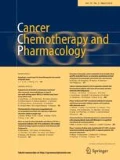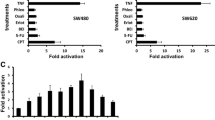Abstract
Purpose: To determine the ability of UCN-01 to abrogate the cell cycle arrest induced by camptothecin (CPT) in tumor cells that lack p53 function, and therefore enhance the cytotoxicity of CPT in these cells in relation to normal cells with wild-type p53. Methods: The responses of MDA-MB-231 and GI 101A breast cancer cells were compared to those of normal bovine endothelial cells. Cytotoxicity was assessed by the MTT assay, and the resulting data were modeled using median-effect analysis. Inhibition of DNA synthesis was determined by loss of [3H]thymidine incorporation, and cell cycle status was determined by flow cytometric analysis of propidium-iodide-stained nuclei. Results: UCN-01, a specific inhibitor of protein kinase C (PKC) presently in clinical trials, abrogated CPT-induced activation of S and G2 checkpoints in human MDA-MB-231 and GI 101A breast carcinoma cells, both of which are mutants for the p53 gene. This abrogation occurred with the use of sublethal doses (100 nM) of UCN-01 and correlated with the enhancement of CPT-induced cytotoxicity. Median-effect analysis showed that synergistic cytotoxic interactions existed between CPT and UCN-01 against these tumor cells. In normal cells, however, abrogation of the S phase arrest caused accumulation in G0/G1 phase, perhaps by the presence of wild-type p53 activity, with no change in CPT-induced cytotoxicity. Conclusion: We have shown previously that the cytotoxicity of CPT is correlated with cell cycle response in normal and tumor cells. Low doses of CPT arrest cells in the G2/M phase and inhibit DNA synthesis, but higher doses cause arrest of cells in S phase. Thus modulation of events at the S and G2 checkpoints may provide an opportunity to enhance CPT-induced cytotoxicity in tumor cells. The results of this study indicate that UCN-01 enhances the progression of tumor cells through S phase thus greatly increasing CPT-induced cytotoxicity. Normal cells, however, are able to arrest in G0/G1 and thus avoid the increased toxicity induced by CPT. Our findings suggest potential usefulness of combining UCN-01 in topoisomerase I inhibitor-based drug therapy for the treatment of breast cancer with a dysfunctional p53 gene.
Similar content being viewed by others
Author information
Authors and Affiliations
Additional information
Received: 25 February 1999 / Accepted: 4 October 1999
Rights and permissions
About this article
Cite this article
Jones, C., Clements, M., Wasi, S. et al. Enhancement of camptothecin-induced cytotoxicity with UCN-01 in breast cancer cells: abrogation of S/G2 arrest. Cancer Chemother Pharmacol 45, 252–258 (2000). https://doi.org/10.1007/s002800050037
Issue Date:
DOI: https://doi.org/10.1007/s002800050037
- AbbreviationsBVEC bovine venular endothelial cells
- cdk cyclin-dependent kinase
- CI combination index
- CPT camptothecin
- DMSO dimethyl sulfoxide
- Fa fraction affected
- IC50 concentration causing 50% inhibition of cell growth
- MTT 3-(4,5-dimethylthiazol-2-yl)-2,5-diphenyl-tetrazolium bromide (thiazolyl blue)
- PBS phosphate-buffered saline
- PKC protein kinase C
- topo I DNA-topoisomerase I
- UCN-01 7-hydroxystaurosporine




